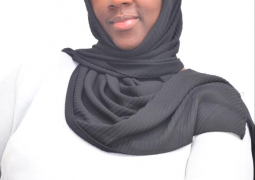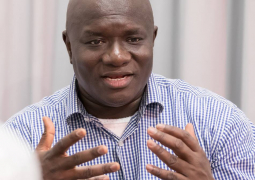Professor Pierre Gomez: What major factors motivated you to come up with the trilogy (When the Monkey Talks, Dabaali Gi and Dreams of the Islands)?
Baaba Sillah: If you ask writers why they write, they will give you umpteen reasons for putting pen to paper. Some write out of rather odd and curious motives. Some write because they need to protect, defend and/or market an ideology. Others write to interrogate deep-seated and enduring philosophical and human concerns and questions about the world and why it is the way it is. Some write to de-construct certain inveterate paradigms that rob humankind of its humanity. Others write to explore, widen, deepen, and share their knowledge of the art. In short, there are many reasons why people are motivated to write. We cannot explore the full extent or range in this interview, but it will suffice to say that no one writes from, as it was, a tabula-rasa. Put simply, all authors have either a hidden or an overt agenda. Several factors propelled me to write, salient among which are the following: I grew up roosting under the wings (in a manner of speaking) of three towering figures, all of whom influenced me throughout my childhood adolescence. My maternal grandmother was born and bred in the heartlands of Jookaadu and passed on to my mother the vibrant and powerfully persuasive story-telling culture that emerged at the intersections of the experiences and the wisdom, the fauna and flora, the folklore, and the history of the Fulbe and the Wolof peoples. My mother was extremely talented socially. For want of a better word, she could perhaps be called a socialite. I saw how easily she made friends and cared for those around her, especially those living precarious lives in the margins of society. She had a gift for languages. She could speak fluent Wolof, Mandinka, Pulaar, Krio. And being one of the first of her generation of Banjul women to go to school, she could speak and write functional English and speak level three Jola. I remember that there were no televisions or access to radio during those times. Only a handful of families owned radios or gramophones. After supper, we children organized our games; Fiyong, Ndóli, Langaaburi, and Jal bi jalaan were popular, especially during moonlit nights. My siblings and I, and all the other children in the household, crowded around her and hurdled up, each with a blanket or night cover to listen to the stories she told. All her stories had a moral that was never left to chance for us to perceive. She made a point about „driving it home‟. Later, when I grew up, I saw how craftily she knitted the lessons of the stories to actual life events: we learnt about helping those that need help, listening to advice, being obedient to our elders, teachers, and authority. She was exceptionally skilled in bringing to life the story through loaded words and images. Her use of prosody, especially when she told the story of Buki and Ñomboo, was remarkable. Buki’s statements were always nasal and alluring. She would carefully guide our feelings of ill-will towards Buki. Ñomboo, on the other hand, spoke with short innocent, victim-like though cunning utterances; Mum would guide our sympathies so that we would always side with Ñomboo. Sometimes, though, I observed her behave totally out of character. I could not reconcile the split in her personality, but after I grew up, I concluded that she had acted in that manner to protect her children from harm. Her departure from her usual self-stemmed from panic at fear-inducing situations, plenty of which were around. There were epidemics, children dying sudden deaths, children dying from curable diseases, children drowning from swimming at sea, and other physical and psychological dangers. These were real fears that all parents would have liked to do without. But there were ample hazards and plenty of grounds for parents to be on edge. The times that we grew up were lean times! Although sometimes I hear my contemporaries or even older people talk about those times with such nostalgia, I wonder if we are talking about the same thing. I saw how my mother and many other women struggled to put bread on the table, support their husbands, and remain deeply loyal and devoted to their families, husbands, and religion. I saw how women bartered for rice over kirintiŋ fences, sorrel, peppers, salt, and other groceries that made those dainty dishes. The mundane chores of daily life entrapped women, but we must hand it to them that they were able, through their imaginative ways, to succeed and to support each other in those challenging times. By the way, I am not naïve enough to declare that all of that is over. No! On the contrary, I have a few neighbours who live in abject poverty and squalor, neighbours who wonder daily where the next meal will come from. I also remember how my mother’s contemporaries, through their informal networks, arranged their osussus, supported each other and planned their lives because the guardianship of Providence did not always exercise its excellent care over everybody. Some of my poetry in all my books, including the anthology Péñcum Taakusaan, was heavily inspired by this phenomenon of perseverance, service, and duty and, of course, my mother’s own benign and powerful influence on me in other long-lasting ways. My granduncle, the Reverend J C Faye, also cast a prodigious influence on me. He was the founder of the first political party in The Gambia, the Democratic Party, a trailblazer, a charming, earthy, and larger-than-life character. I spent all my formative years around him, during the build-up towards self-rule. I was his protégée. I ran his endless practical errands as well as attended his rallies. I eavesdropped on his conversations with his party militants and with his adversaries and above all, I drank from every pearl of wisdom that fell from his breath. Although I was still young, I was able to discern his manifold abilities as an educator, a politician, a man of the cloth and a man committed to doing all he could for those struggling to free themselves from the fetters of necessity. I certainly did soak up some of his values and some of his ways! I learnt from him that people differed politically from each other based on the values and the ideological stances that they took independently of their religion. Religious beliefs could influence one’s viewpoints but need not cloud one’s vision to the extent that one would decry and vilify one’s adversaries simply because they were from a different religious persuasion. My father, Mataar (better known as Master Sillah), is the third figure. A boy of the old school notwithstanding, he imprinted his interest in sports, agriculture, Islam, and, to some extent, his gregariousness and humour. He spent a lifetime pushing chalk on a blackboard, educating three generations of Gambians. He was a classic all-rounder in the arts, just like all his contemporaries who had had the rare chance of a colonial and missionary education. Despite the obvious dangers and errors of colonial education, those that survived it maintained certain standards and received a thorough and rigorous general grounding. My father taught me to read and write the Roman alphabet and numbers. To teach me how to read Arabic texts in the Quran, he began by teaching me to read Wollof transliterated with the Arabic alphabet before teaching me how to put letters together, which helped me break the reading code in Arabic. So quite early in life, he exposed me to books and literature. I often recall two of my favourite memories of him standing over me in the mornings repeating what I called his mantra: “He who sleepeth, looseth, boy. Wake up”. The second was that he drilled into me the evils of idleness so that when I saw him coming in the distance, I would run and grab a book to appease him. Otherwise, it would be another mantra: “Idleness is fertile ground for mischief and delinquency”. These have stayed with me even long after he passed. He did try to engage me, now and then, in mutual dialogue, but it always wound up in a monologue. Whether out of sheer respect for him or ingrained fear, it took me a long time to build up the courage to dialogue and debate with him. In all fairness, though, when I was about 19, he insisted that I eat with him and keep him company during mealtimes. Little did I know that it was time, in his judgment, to relate to me as a man. The relationship was clumsy, but soon enough, we groped around each other’s spaces and found our rhythm. Since the boundaries between us collapsed, we haven’t looked back. We melted, as it were, our separateness and became life-long friends. I saw both him and Faye put together some impressive work on “Wolof syntax and Wolof grammar”. Unfortunately, future Gambians generations have been robbed of the best part of that piece of their literary inheritance. Only a tiny segment of that work can be found languishing at the School of Oriental and African Studies in London. Coming from a long line of Islamic cleric families, Master had ensured that my knowledge of Islam did not play second fiddle. Of course, there were other influences from religious teachers, regular schoolteachers, the civil rights movements, “Black Power”, “Flower Power”, my involvement as a student and political activist in Britain, exposure to revolutionary literature, critical theory and so on. They all came together to create the person I am. The other dimension to my story was my involvement with all the campaigns in the 1970’s and 1980’s, most notably the Anti-Apartheid movement in South Africa, but also campaigns in Argentina, Zimbabwe, Guyana under Forbes Burnham, support for change in St Vincent, anti-racist campaigns in Britain, unionization of black and Asian workers, Brixton, New Cross campaign, the “sus”- campaign, campaigns against placing black and Asian children in educationally sub-normal schools etc. Having taught in London for several years, I went back to The Gambia and realized that a lot needed to be done in my own field of enquiry and involvement. Things from then on did not seem black or white to me anymore. The political climate was stifling! The tolerance thresholds for dissenting opinions were very low, and engaging in any critical dialogue, even innocuous, was foolhardy. I browsed through the schools’ curricula and found them most wanting. The standards of education had declined significantly. I paused and looked back at my journey. Everything was muddled up, unwieldy and confused. At the time, I was teaching a crop of student teachers, student nurses and student agriculturalists. I found them to be committed to their future professions but not up to the task ahead of them. As to their future and our common future… Well! I pined! I asked myself what had gone wrong. Ever since then, I have been trying to find an answer to this question and I am still searching. The more I search, the more troubled I become! In that state of flux, I felt a quiet storm raging within me that climaxed into an epiphany. Its calling compelled me to go back to the beginning, go back to the genesis. To go back, as it were, to where the rain began to beat us (paraphrasing Achebe). It was to that beginning that I went back.
Read Other Articles In Opinion

How to be more resilient and bounce back from setbacks and adversities
Feb 25, 2021, 2:21 PM

Commentary: The Africa we strive for is possible in unity and solidarity
May 28, 2021, 12:41 PM



